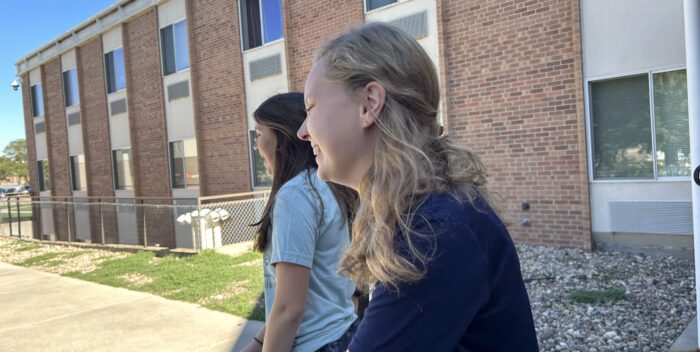Dorms are full so Concordia loosens up rules for off-campus living
Photo description: CUNE students laugh as they walk outside of on-campus David dorm.
Photo credit: Courtney Wright
Nora Betts
Sower Staff
Concordia has changed its housing eligibility guidelines to allow an estimated 50 additional students to live off-campus next year, as the student population is projected to outgrow the capacity of the residence halls, said Vice President for Student Affairs Gene Brooks.
Students may now live off-campus if they are age 21 or older by Dec. 31 of the academic year. The guidelines previously required students to live on campus for their first three years and be 21 by Oct. 15 of the academic year, or be married, supporting a child or living with their parents.
Brooks said the new guidelines are due to high enrollment and large incoming classes. This fall, Concordia saw an undergraduate enrollment of around 1,240 students, including 434 freshmen, its highest since 1968.
Brooks said the administration considered the student age makeup and projections of which students would choose to live off-campus when changing the guidelines. He said the new rules would create enough on-campus space for the projected higher number of students.
“We did some calculating on the age makeup of our student body and took a look at how many students will turn 21,” said Brooks. “The portion of [students] that would probably decide to live [off-campus] would free up enough space so that we would have room for everyone else in the residence halls.”
Brooks said the 11 residence halls on campus can house around 900 students and are already near maximum capacity. Approximately 400 students already live off campus, he said.
He said the goal for enrollment is 1,300 students. Once that number is reached, it will be maintained, not exceeded, according to Brooks.
Brooks said he predicts future changes will make students eligible for off-campus housing after only two years on campus.
“We think this will be the trend, that we’re going to bring in those classes that are 430 [students or more] and so the following year we will need to make another adjustment to the policy,” he said. “Eventually, it could end up being you’re just required to live on-campus for two years. We’re not there quite yet.”
Brooks said he wants CUNE to remain a largely residential campus so students can stay involved in the campus community and access student resources. He said the on-campus experience will not change, but off-campus students may feel less connected to others.
“We’re going to have just as many students as we normally have and our residence halls will be full,” said Brooks. “I think the experience on campus won’t change. But it will impact the experience of students off campus because – and we’ve heard this from students – they feel less connected. They’re not as engaged with other students.”
According to Brooks, living off campus is not necessarily cheaper than living on campus. He said that responsibilities like food expenses, utilities and maintenance usually end up around the same cost as living on campus.
Brooks said another challenge to off-campus living is finding a place to stay in Seward because the town has limited housing.
Brooks said that living off campus does serve as a transitional step in life that teaches students valuable life skills.












